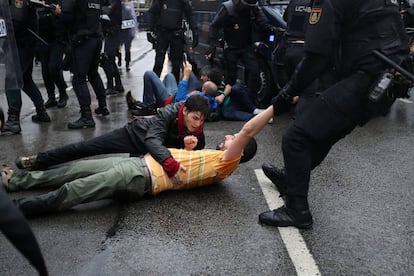How many people were really injured during the Catalan referendum?
President of a pro-independence association says a figure like this “has not existed in Europe since World War II”
The Catalan government maintains that 893 people were injured last Sunday as a result of the police action ordered to stop the illegal referendum in Catalonia. The Catalan Health Department, which manages healthcare in the region, reports that four people were admitted to hospital, two of them in “serious condition.” That figure was published by many international media outlets.

Jordi Sánchez, the head of a pro-independence civil association called Catalan National Assembly (ANC), said in an interview with Spanish private television station La Sexta that “this many wounded has not existed in Europe since World War II.”
It is not necessary to delve too deeply into the history books to prove that Sanchez’s statement is exaggerated. There were, for example, more serious injuries in riots and protests against the G20 in Hamburg this past May. Not to mention the wars in the former Yugoslavia or the riots in Ukraine in 2014 and 2015.
So how many people were really injured in Catalonia on October 1? Are injured people the same as those who receive medical attention?
Mostly what was attended to were bruises, dizziness and anxiety attacksCatalan health department
There is no doubt that there were injuries as a result of the National Police and the Civil Guard’s actions. The pictures prove it. But according to Doctors Without Borders, which cites international humanitarian law, the injured are “people in uniform or civilians who need medical attention because they are suffering from trauma, illness, or other physical or mental disorder.” It is important to turn to international legal organizations and frameworks for definitions, now that the secessionists are appealing to the same sources to definitively break with the rest of the country.
Is it possible that these 893 people were suffering from trauma or illness? On several occasions throughout Sunday, the official Twitter account for the Catalan Health Department reported that “mostly what was attended to were bruises, dizzy spells and anxiety attacks.”
On Monday, the Catalan health service issued several documents in Catalan, French, and English admitting that the figure of 893 represents people “who have been seen by doctors.” It’s clear that just because someone sees a doctor, it does not mean that they are hurt or sick.
In total, four people were admitted into hospitals for treatment, two with minor conditions and two in serious condition. One man was hit by a rubber bullet in the eye, surely fired by the Civil Guard or the National Police, because the Catalan police do not use such equipment. The other is a man who suffered a heart attack during one of the police interventions.
There were more than 700 people injured, people who went to cast a vote, not to rob a bank!
On Tuesday, a woman claimed the police had broken several of her fingers. Her story led Pep Guardiola, the Manchester City soccer team coach, to speak out: “They broke one woman’s fingers. There were more than 700 people injured, people who went to cast a vote, not to rob a bank!” The broken fingers turned out to be inflammation in one finger, as she herself has since admitted. Doctors have prescribed three days of rest.
Certainly, there are people who had to receive treatment for injuries, but the Catalan government’s information is ambiguous. It has not provided data on how many of those cared for by the emergency services suffered physical injuries, dizziness, or anxiety attacks.
The Spanish Interior Ministry said on Sunday that 39 National Police and Civil Guard officers were injured. On Monday, the number of officers who sustained bruises, scratches, kicks and even bites increased to 431.
English version by Debora Almeida.









































